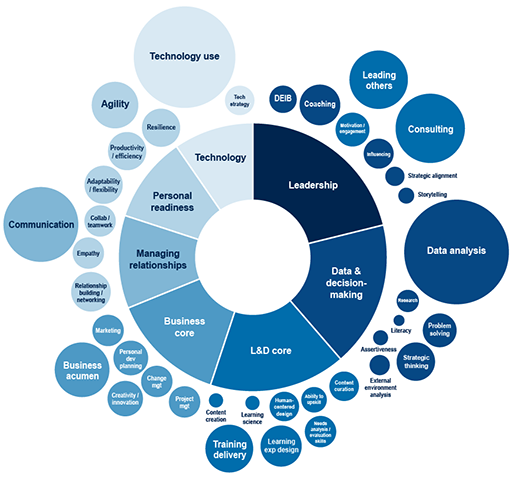8 Transforming your organisation for the future
As HEIs evolve and adapt, they need to consider the internal capabilities they have to deliver their organisational objectives and student outcomes, and to respond to external factors that demand new skills.
Who they will need to support these changes is a key question for organisations to address. Understanding your existing capabilities and identifying skills gaps will assist in planning for the future: do you have employees who are capable of developing themselves to meet the needs of the organisation, or do you need to recruit? It is vital that you have a balance of existing employees who understand your organisation, and new starters that can work with them in collaboration to meet the changing needs.
The LinkedIn Workplace Learning Report 2022 [Tip: hold Ctrl and click a link to open it in a new tab. (Hide tip)] highlights that leadership skills are most important for the future. The infographic below provides a useful oversight of areas of learning and development (L&D) that need to be considered.
HEIs can bring a unique perspective to developing their organisational capabilities by thinking about how professional services and the academic community could be involved in designing internal ‘Learning and Development’ plans for the long term. Enabling a culture within a HEI that encourages involvement and integrates stakeholders and expertise from different areas of the organisation, as well as with external partners, offers the potential to develop a ‘Learning and Development’ strategy that ensures the capabilities of your workforce will be raised.
Focusing on the needs of the organisational workforce, aligned to its strategy and understanding the external environment, allows for a more targeted and effective approach. This may involve creating new roles within your organisation, to lead on the areas you need to develop.
One of the key concerns for organisations is the digital skills gaps, and how to build digital capabilities within the workforce. This can be complex because most organisations’ technology and digital dependencies will also be complex, and governance, compliance and behaviour must be integrated into capability building. Nearly every member of an organisation will need digital skills but, depending on their role, these could range from specialist skills – for example DevOps developers – to just the ability to use email effectively in more manual roles.
Activity 23: Growth in the flow of work
Read the article A New Strategy For Corporate Learning: Growth In The Flow Of Work and consider your what and how for developing your approach to learning and development within your organisation. You may wish to make notes in the free text box below.

